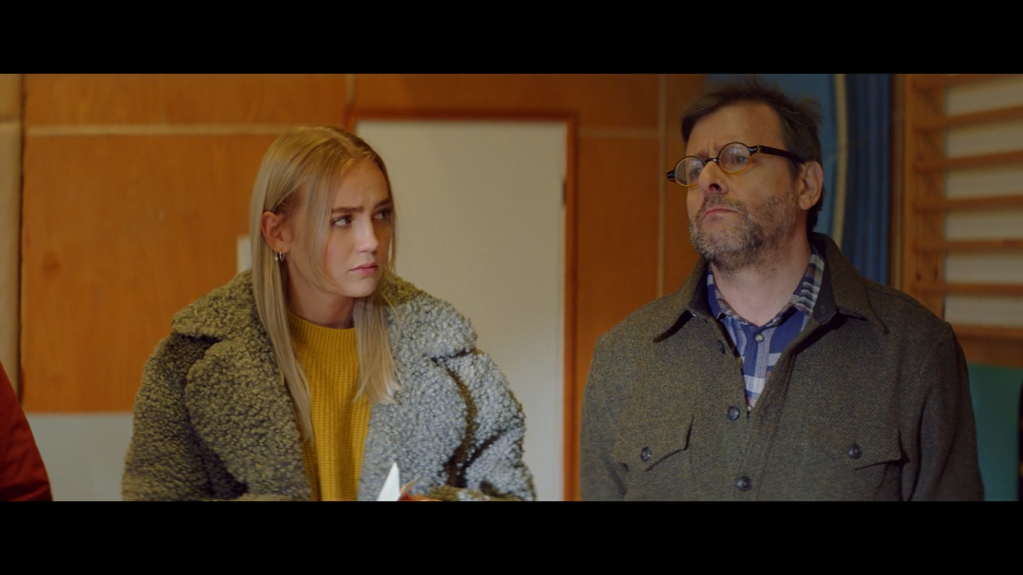
The gorgeous, breath-taking landscape of Iceland is the ultimate source of energy that feeds the soul of Max Newsom’s Iceland is Best. Against the incredible vistas of black-sand beaches, snow-filled valleys and jagged mountain ranges, the stirring majesty of the island both contrasts and complements the film’s subtle meditation on love and relationships; on youthful existentialism; on innocence and experience.
It makes for a film that is both beautiful and enchanting, as we follow 17-year old Sigga (Kristín Auður Sophusdóttir), and her attempts to leave Iceland for California, where she hopes to realise her dream of becoming a poet. On this journey she is joined by her three friends (her “guardian angels”, as one, Gunni describes them), and – fatefully – by a stranger; the loud and charismatic Nikki (Tom Maden).
If it’s true that there are only two types of story – ‘a person goes on a journey’ and ‘a stranger comes to town’ – Iceland is Best is thus a film that combines both narrative elements. And as Sigga’s youthful existential angst drives her forwards and backwards, buffeted by the fates on her own odyssey, Nikki rushes to meet her head on; a strange and at times opposing force that disrupts and disorientates.
Yet as Sigga and Nikki’s spiritual forces collide, we spring from scene to scene and place to place as though fractured in a kaleidoscopic shard of Icelandic ice. Newsom’s keen ear for dialogue delivers a script on which the emphasis is placed on brief conversations in which every word tells, and non-verbal communication is just as important as those words that are said. But this does mean we often find ourselves arriving in new places only to leave again shortly afterwards. New characters emerge and stand quietly in the background, encountered and acknowledged without always fully entering the narrative. This combines with the short scenes to create a sense of a lack of permanence; we feel unable to find our footing. In this way, the film mirrors that agitated feeling of youth; the anxiety in the pit of your stomach that shifts you from one mood, one feeling, to the next, and propels you forwards without a necessarily clear sense of direction.
“Sometimes, you don’t know when a journey ends”, Sigga’s grandfather tells her. It’s a true enough statement, and a lovely meditation and thought in its own right; but we might consider, watching this film, that the inverse is also true: you don’t always know when a journey begins, either.
Watching Sigga’s repeated attempts to reach her main objective, we are thus encouraged to look inwards, and to consider our own journeys; our own destinations; our own stories.
Both lead roles are played with real range and depth by their young actors; but the real strength of this film comes from the supporting ensemble.
Judd Nelson (The Breakfast Club) is the star draw in this respect, and his turn as Mr. Sondquist is perfectly weighted. Yet in Sigga’s ‘Guardian Angels’, Mikael Kaaber
Álfrún Laufeyjardóttir, and Atli Oskar Fjalarsson we see just how valuable it is to have such clear chemistry between the players involved. Oskar Fjalarsson, in particular, stands out – playing in effect two roles, as he communes with and speaks for an anthropomorphised tribal canoe, Topanka.
Of course, the real lead role is held for Iceland itself. There is something ethereal and transcendental about this small volcanic outcrop of rock. This land of fire and ice famously inspired J.R.R. Tolkien’s Middle Earth; and before him, Jules Verne chose Iceland as the gateway for his Journey to the centre of the earth (itself inspired by Icelandic sagas), as Verne’s protagonists begin their journey via Iceland’s Snæfellsjökull glacier. And while Newsom can’t resist a sly reference to this final point of trivia – as one character reveals the fate of another – it’s ultimately further proof of the love that the director has for this island. It’s a love that is evident in every shot, the light of the ice and sun brilliantly captured on stunning 35mm. It combines to provide a meditative quality to the cinematography that perfectly matches the setting, and perhaps ultimately provides the evidence to support the film’s central hypothesis: Iceland is best.


On Mon, Sep 6, 2021 at 11:05 AM nothing in the rulebook wrote:
> professorwu posted: ” In Iceland is Best, feisty teenager Sigga (Kristin > Auður , left) longs to move to California from her small hometown in > Iceland. The gorgeous, breath-taking landscape of Iceland is the ultimate > source of energy that feeds the soul of Max Newsom’s Ic” >
LikeLike
I wanted to know the name of the white lighthouse shown in the movie.
LikeLike